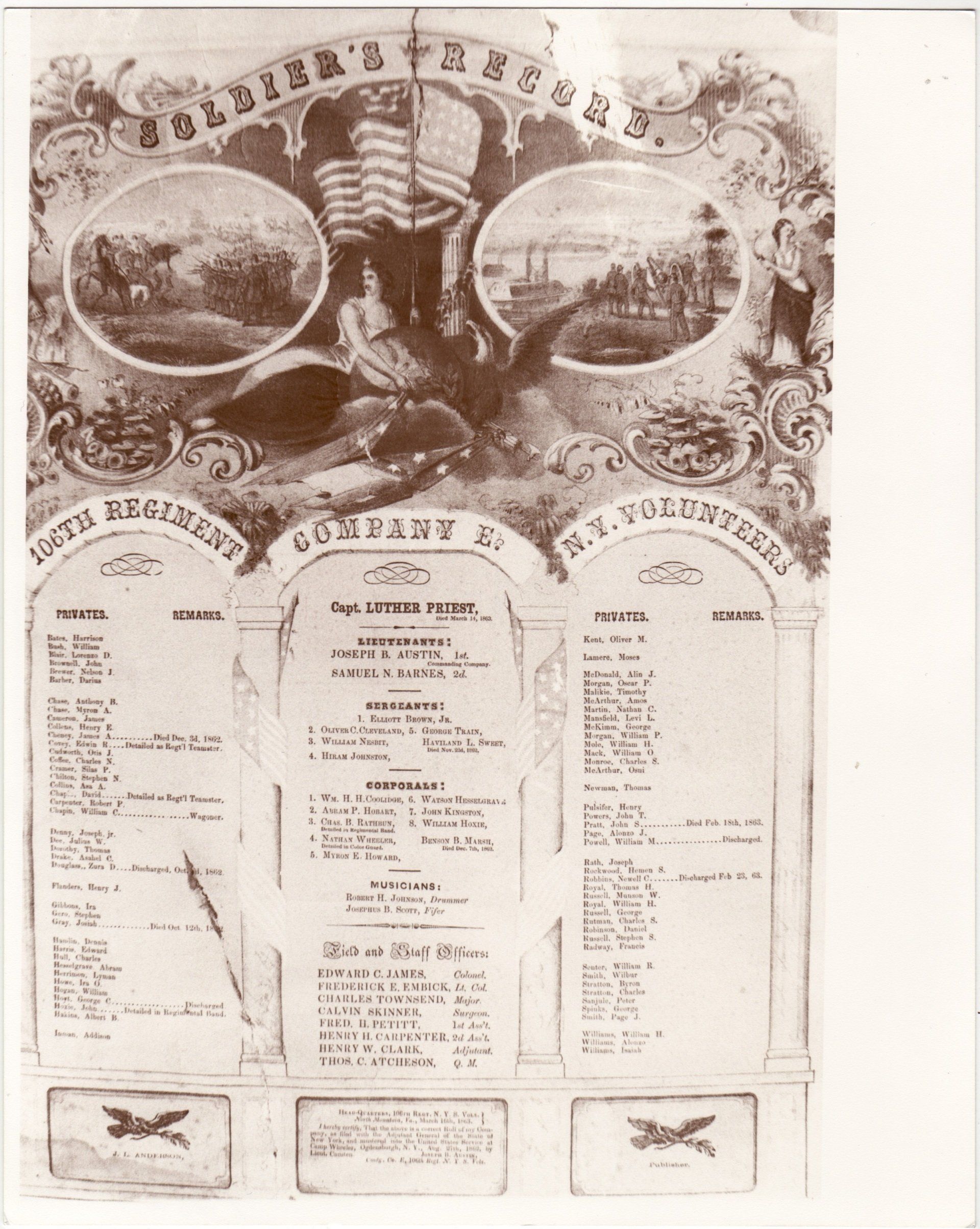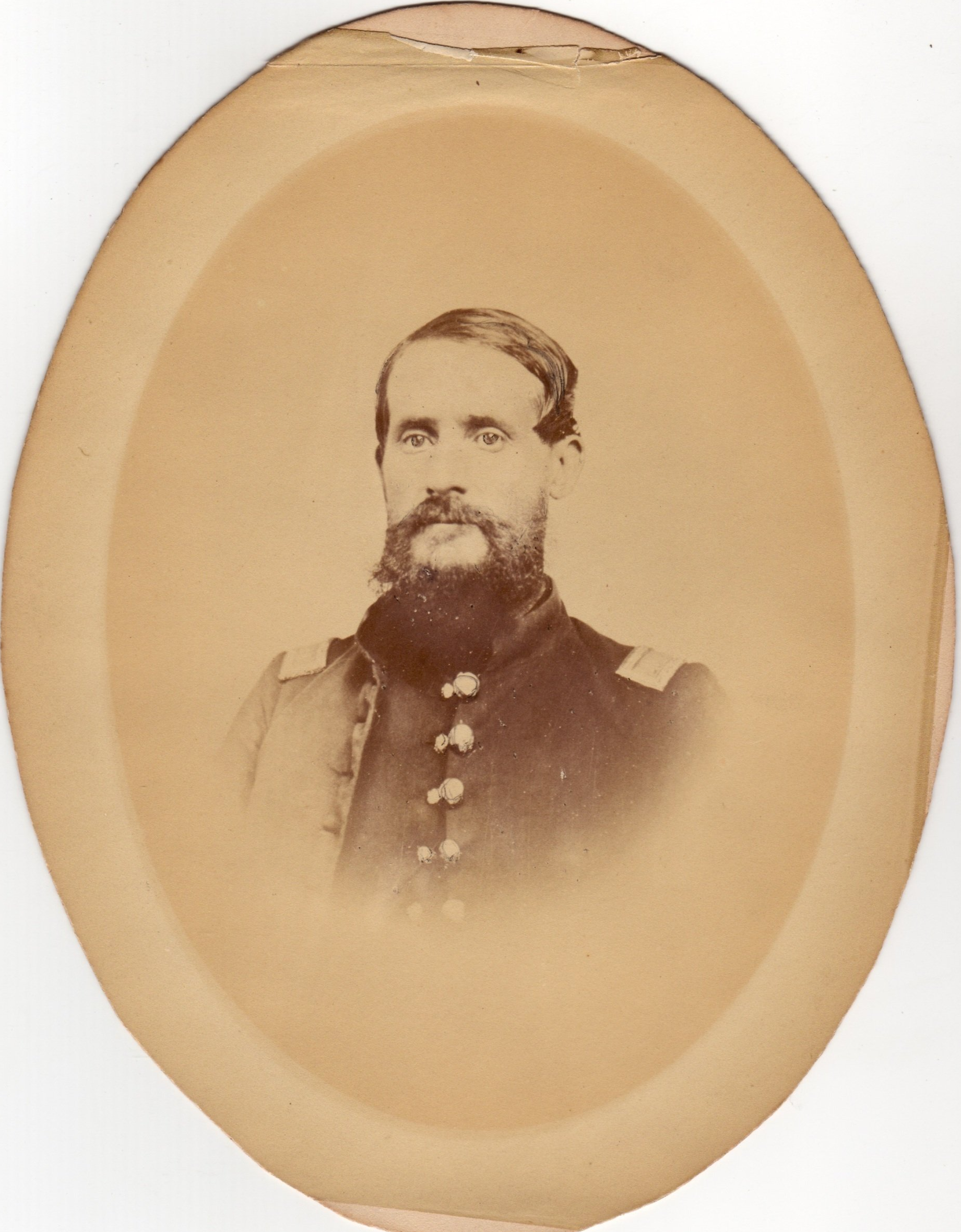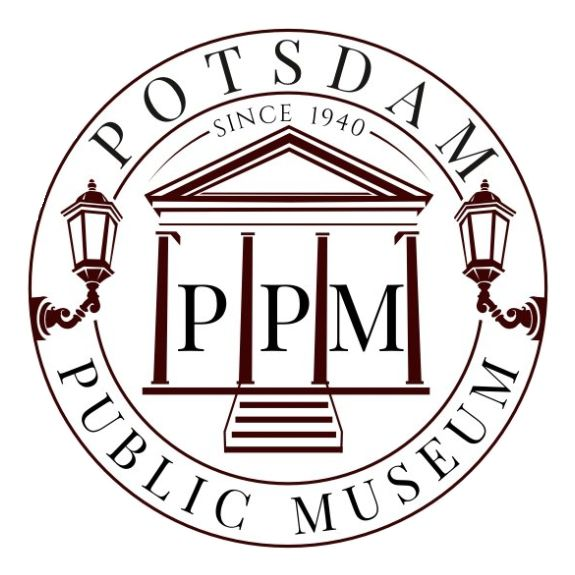106th Regiment/ Capt Priest
By July, 1862, when the War of Rebellion was becoming increasingly costly to the Union forces, President Lincoln issued another call for 300,00 men for the Army. Governor Morgan of New York State followed with a proclamation authorizing General S. T. Judd to raise another regiment in the North Country, to be known as the 106th Regiment, New York Volunteers.
The new Regiment was to be rendezvoused at Ogdensburg and the men were to be recruited from St. Lawrence, Jefferson, Lewis, Franklin, Clinton, Essex and Warren Counties.
[August 2, 1862]
Luther Priest and J. B. Austin of Potsdam were authorized to raise a company of men from the village. That same week, local citizens held a meeting of the Town Hall to consider measures to promote the enlistment of volunteers. The finance committee, made up of Charles G. Tappen, A. X. Parker and T. S. Clarkson II, invited subscriptions to pay bounty and recruiting costs of raising a company for the 106th. The first amount collected was more than $2,300, all by private subscription. T. S. Clarkson II headed the list with a subscription of $300, with other various contributions, the lowest being $1.

Company E of the 106th, enlisted at Potsdam, was sworn in and its officers elected at Camp Wheeler, Ogdensburg, on August 15, 1862. Officers were as follows: Captain Luther Priest, Potsdam: 1st Lt. Joseph B. Austin, Potsdam: 2nd Lt. S. N. Barnes, Lawrence: 1st Sgt. Elliot Brown Jr., Parishville: 2nd Sgt. G. C. Cleveland, Potsdam: 2rd Sgt. H. L. Sweet, Colton: 4th Sgt. Hiram Johnston, Potsdam: 5th Sgt. George Train, Pierrepont: 1st Corp. William H. H. Cooledge, Potsdam: 2nd Corp. Page J. Smith, Parishville: 3rd Corp. Chas. B. Rathbun, Parishville: 4th Corp. Nathan Wheeler, Colton: 5th Corp. Myron E. Howard, Potsdam: 6th Corp. Benson B. Marsh, Parishville: 7th Corp. John Kingston, Brasher: 8th Corp. William Nesbit, Potsdam.
The company had 86 enlisted men: total strength of the Company was 102 officers and men.
The regiment was armed with Enfield rifles, left Camp Wheeler on August 29, 1862. 1,000 strong, under the command of Col. S. F. Judd, and arrived at the seat of War amid the excitement which preceded the battle of Antietam. They were first stationed at New Creek, Virginia, at Camp Jessie, and in honor of Mrs. Fremont.
Previous to the spring campaign of 1865, the ranks of the Regiment were filled to about 900 strong by the return of recovered sick and wounded, exchange prisoners and new recruits. They returned home with 405 officers and men, having transferred 300 in the 49th Regiment, New York Veterans. Among the gallant dead of the 106th, who died in the services, were Lt. Col. Charles Thompson, Capt. Jackson, Capt. Priest, Capt. Chamberlain, Capt. Hooker, Capt. Parker, Capt. Peach, Lt. Hopkins, Lt. Shepard, Lt. Hathaway, Lt. Blackman, Lt. Bayne, Lt. Kingston, Lt. Holland, and a long list on non-commissioned officers and privates. When the Regiment returned to St. Lawrence County on July 2, 1865, Ogdensburg staged a grand affair to welcome them home. There they disbanded and the men returned to their own villages.

General Merritt was also extremely active in local affairs. He was particularly instrumental in locating the Normal School in Potsdam. In 1867, the State of New York passed a law authorizing the establishment of four normal schools. Albany and Oswego had already been selected. Many communities applied for the location of the two other schools, including Ogdensburg and Plattsburgh. Among them was an application from the Board of Trustees of St. Lawrence Academy, Potsdam. The Board offered the Academy property, including lands and buildings. General Merritt presented the application as a member of the Board of the Academy. He was at that time on Governor Fenton's staff. After much difficulty, the Normal School was located in Potsdam, after assurances were received by the location board in Albany that the Potsdam locality would provide $72,000 in addition to the offer of the Academy buildings.

The tragic death of Captain Luther Priest of Company E of the 106th Regiment was a great shock to his men and to the Village of Potsdam. He died of lung fever on March 14, 1863, at Martinsburg, Virginia. His body was returned to Potsdam, where the funeral services were held on Saturday, March 21, 1863. They were conducted the the Rev. I. N. Hobard of Adams.
After the exercises at the Church, a large procession formed to accompany the remains to the grave at Parishville, where reposed his kindred and friends.
Captain Priest and his wife and family made their home on the Priest farm on the Norwood Road. Following his death, Mrs. Priest moved into town, and lived on Leroy Street. Many years after her death, the Priest house was divided into two sections and the front moved to Chestnut Street.



